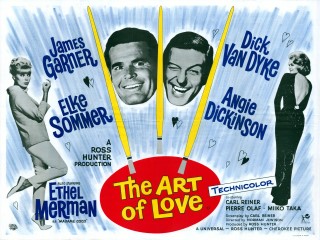
ART OF LOVE
US, 1965, 99 minutes, Colour.
James Garner, Dick Van Dyke, Elke Sommer, Angie Dickenson, Ethel Merman, Carl Reiner.
Directed by Norman Jewison.
The Art of Love is an amusing 60s comedy directed by Norman Jewison. Jewison was emerging as a prominent director at this time and was to direct the Oscar-winning film In the Heat of the Night two years later (though not getting a nomination himself). Jewison has had a prolific career over forty years and a great range of films from Fiddler on the Roof and Jesus Christ, Superstar to Agnes of God and, in 1999, Hurricane with Denzel Washington.
James Garner was also emerging at this time as a popular star (Wheeler Dealers, Move Over Darling) and Dick van Dyke had just appeared in Mary Poppins. Both Elke Sommer and Angie Dickinson were also beginning to be prominent leading ladies at the time. In the supporting cast is a humorous cameo from Ethel Merman as well as from director Carl Reiner.
The film has an interesting premise – Dick van Dyke as an aspiring artist in Paris who hears that it is better to be dead to sell one’s paintings than alive and so, with his friend, James Garner, decides to fake his suicide. As expected, complications arise – with his friend moving in on his fiancée. However, as in these films, after the farcical situations and humorous lines, all’s well that ends well.
1. The indications of the title, audience expectations? The art of love, American style?
2. The interest and appeal of sex comedies: innuendo, humour, risque jokes, situations and choices? A matter of taste and style?
3. Why do sophisticated and glossy comedies appeal? The humour, the style, the atmosphere of fantasy, the pretensions to reality?
4. The value of comedies of manners and morals? Values communicated humorously and lightly?
5. How well were they combined in this film? Dialogue, characters and caricatures, identies and mistakes, quick thinking, chases, farce? Even though the film is predictable? How successful does it still remain?
7. Was there any serious side of this film? Even in Paul's death? The situations and characters asking for a light response?
8. How plausible were the situations? Especially the finale?
The impact of these on audiences for involvement and enjoyment?
9. Paul, how interesting a character, as an artist, exploited? a nice man learning revenge, his vindictiveness in the court case, his repentance, the credibility of his relationship to Laurie, to Nikki?
10. How credible was Casey the conman? A typical man? Exploiting Paul, Laurie's affections? Did he deserve the suffering of the court case and the execution?
11. How attractive were Nikki and Laurie? Credible characters for this kind of film? Real women or not?
12. The incidental humour in Coco and her house? Colourful comedy?
13. Is this a recognisable American version of comedy? What are its characteristics? How well were the conventions used?